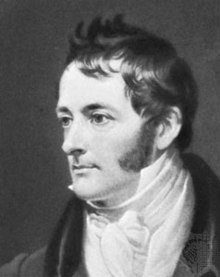William Henry (chemist)
 From Wikipedia - Reading time: 9 min
From Wikipedia - Reading time: 9 min
William Henry | |
|---|---|
 | |
| Born | 12 December 1774 |
| Died | 2 September 1836 (aged 61) Pendlebury, England |
| Nationality | English |
| Alma mater | University of Edinburgh |
| Known for | Henry's law |
| Awards | Copley Medal (1808) |
| Scientific career | |
| Fields | Chemistry Physician |
William Henry FRS (12 December 1774 – 2 September 1836) was an English chemist. He was the son of Thomas Henry and was born in Manchester England.[1][2] He developed what is known today as Henry's Law.
Life
[edit]William Henry was apprenticed to Thomas Percival and later worked with John Ferriar & John Huit at the Manchesters Infirmary.[citation needed] He began to study medicine at University of Edinburgh in 1795, taking his medical in 1807, but ill-health[a] interrupted his practice as a physician, and he devoted his time mainly to chemical research, especially with regard to gases. One of his best-known papers (published in Philosophical Transactions of the Royal Society, 1803) describes experiments on the quantity of gases absorbed by water at different temperatures and under different pressures.[3] His results are known today as Henry's law. His other papers deal with gas-analysis, fire-damp, illuminating gas, the composition of hydrochloric acid and of ammonia, urinary and other morbid concretions, and the disinfecting powers of heat. His Elements of Experimental Chemistry (1799) enjoyed considerable vogue in its day,[4] going through eleven editions in 30 years.[5] He was one of the founders of the Mechanics' Institute, the original precursor of University of Manchester Institute of Science and Technology.
He was elected a Fellow of the Royal Society in February 1809, having been awarded their prestigious Copley Medal in 1808.[6]
He shot himself in his private chapel at Pendlebury, near Manchester, in 1836.[1]
See also
[edit]Notes
[edit]- ^ An injury in childhood caused him intermittent pain throughout his life.
References
[edit]- ^ a b Greenaway, Frank (2004). "Henry, William (1774–1836)". Oxford Dictionary of National Biography (online ed.). Oxford University Press. doi:10.1093/ref:odnb/12981. Retrieved 18 July 2011. (Subscription or UK public library membership required.)
- ^ The Book of Manchester and Salford; for the British Medical Association. Manchester: George Falkner & Sons, 1929; pp. 34-35
- ^ Henry, William (1 January 1803). "Experiments on the Quantity of Gases Absorbed by Water, at Different Temperatures, and under Different Pressures". Philosophical Transactions of the Royal Society. 93. London: 29–274. doi:10.1098/rstl.1803.0004.
- ^ Henry's manual on chemistry and Parkes's manual on chemistry are mentioned by Charles Darwin as books that he studied before attending Cambridge. Darwin, Charles (1901). The life and letters of Charles Darwin. Vol. 1. D. Appleton. p. 32.
- ^ One or more of the preceding sentences incorporates text from a publication now in the public domain: Chisholm, Hugh, ed. (1911). "Henry, William". Encyclopædia Britannica. Vol. 13 (11th ed.). Cambridge University Press. p. 302.
- ^ "Library and Archive Catalogue". Royal Society. Archived from the original on 3 October 2012. Retrieved 18 November 2010.
Further reading
[edit]- Elwood, Willis J. & Tuxford, A. Felicité (eds.) (1984) Some Manchester Doctors: a biographical collection to mark the 150th anniversary of the Manchester Medical Society, 1834-1984. Manchester: Manchester University Press
- Henry, William Charles (1837) A Biographical Account of the late Dr Henry. Manchester: F. Looney (Dr William Charles Henry, also known as Dr Charles Henry, was a son of William Henry; he donated the first collection of scientific books to the Owens College Library in 1851.)
External links
[edit]- Stephen, Leslie; Lee, Sidney, eds. (1891). . Dictionary of National Biography. Vol. 26. London: Smith, Elder & Co.
- Thornber, Craig. "Thomas Henry, FRS and his son William Henry, MD, FRS, GS".
 KSF
KSF